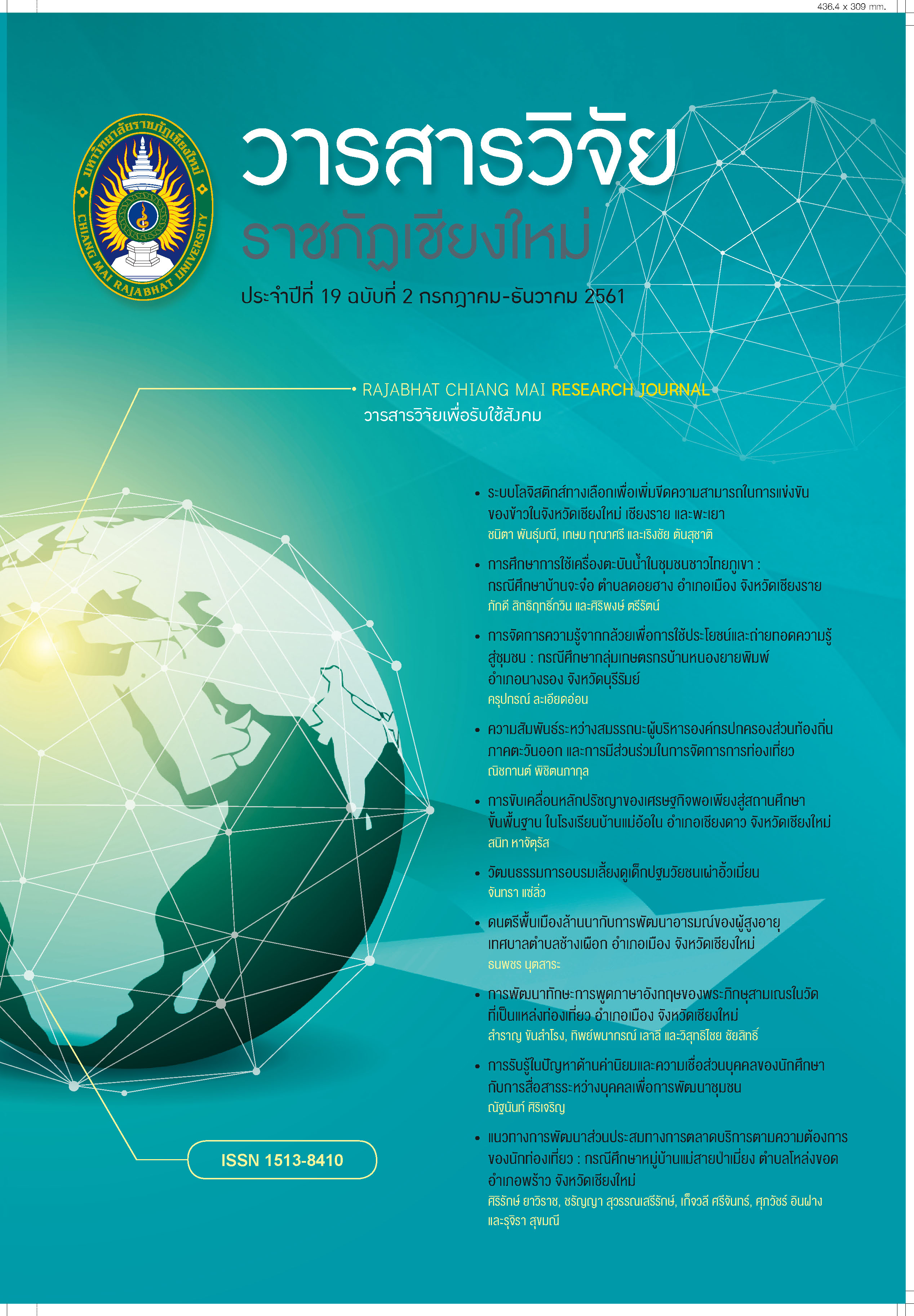การพัฒนาทักษะการพูดภาษาอังกฤษของพระภิกษุสามเณรในวัดที่เป็น แหล่งท่องเที่ยว อำเภอเมือง จังหวัดเชียงใหม่
DOI:
https://doi.org/10.14456/rcmrj.2018.152781คำสำคัญ:
คู่มืออบรมทักษะการพูดภาษาอังกฤษ, พระภิกษุสามเณร, วัดที่เป็นแหล่งท่องเที่ยวบทคัดย่อ
การวิจัยนี้มีวัตถุประสงค์ในการสร้างคู่มืออบรมสำหรับพัฒนาทักษะการพูดภาษาอังกฤษเพื่อการสื่อสารด้านพระพุทธศาสนา ศิลปะและวัฒนธรรมท้องถิ่นแก่พระภิกษุสามเณรในวัดที่เป็นแหล่งท่องเที่ยวในอำเภอเมือง จังหวัดเชียงใหม่ และศึกษาความคิดเห็นของนักท่องเที่ยวต่างประเทศต่อทักษะการพูดภาษาอังกฤษเพื่อการสื่อสารด้านพระพุทธศาสนา ศิลปะและวัฒนธรรมท้องถิ่นของพระภิกษุสามเณรในวัดที่เป็นแหล่งท่องเที่ยวในอำเภอเมือง กลุ่มตัวอย่างเป็นพระภิกษุสามเณรที่พำนักวัดที่เป็นแหล่งท่องเที่ยวในอำเภอเมือง และผ่านการคัดเลือกทักษะการพูดภาษาอังกฤษเพื่อการสื่อสาร จำนวน 40 รูป และนักท่องเที่ยวต่างประเทศที่เข้าชมวัดที่เป็นแหล่งท่องเที่ยวต้นแบบ 3 วัด ได้แก่ วัดพระสิงห์วรมหาวิหาร วัดสวนดอก พระอารามหลวงและวัดเชียงมั่น จำนวน 36 คน เครื่องมือที่ใช้ในการวิจัย คือ คู่มืออบรม แบบประเมิน แบบสัมภาษณ์ และแบบสอบถาม
ผลของการศึกษา พบว่า คู่มือฯ ที่สร้างขึ้นมีประสิทธิภาพ (E1/E2) เท่ากับ 69.79/81.42 ช่วยพัฒนาทักษะการพูดภาษาอังกฤษแก่พระภิกษุสามเณรที่เข้าร่วมวิจัยชัดเจน เห็นได้จาก คะแนนประเมินหลังการอบรมและฝึกปฏิบัติตามคู่มือฯ ในครั้งที่ 1 (=69.79±12.92) และครั้งที่ 2 (ประเมินห่างจากครั้งแรก 1 สัปดาห์) (=81.42±9.62) สูงกว่าก่อนฝึกอบรมและฝึกปฏิบัติตามคู่มือฯ (=52.12±12.92) อย่างมีนัยสำคัญทางสถิติที่ระดับ .001 นอกจากนี้ นักท่องเที่ยวต่างประเทศที่ร่วมการวิจัยให้สัมภาษณ์โดยรวมว่า มีความพึงพอใจในทักษะการพูดภาษาอังกฤษของพระ มีความสุขและเห็นว่าการที่วัดจัดให้มีการบรรยายข้อมูลเกี่ยวกับวัด พระพุทธศาสนา และศิลปวัฒนธรรมโดยพระเป็นประโยชน์ต่อนักท่องเที่ยวต่างประเทศเป็นอย่างมากและควรคงไว้
Downloads
เอกสารอ้างอิง
พยาบาลโดยบูรณาการกับโครงการบริการวิชาการ. การพยาบาลและการศึกษา, 3(2), 28-43.
กรรณิกา คำดี. (2557). วัดและศาสนสถานในมิติของการท่องเที่ยว. วารสารบัณฑิตศึกษา มนุษยศาสตร์และสังคมศาสตร์, 4(2), 177-188.
พระสุธีรัตนบัณฑิต และพระใบฎีกาสัญญา อภิวณฺโณ. (2529). ยุทธศาสตร์การท่องเที่ยวทางพระพุทธศาสนาและวัฒนธรรมของไทยและอาเซียน. วารสาร มจร พุทธปัญญาปริทรรศน์, 1(3), 7-24.
ภัชรบถ ฤทธิ์เต็ม. (2550). รูปแบบการจัดการท่องเที่ยวเชิงศาสนาและวัฒนธรรมในวัด. จังหวัดเชียงใหม่ : มหาวิทยาลัยมหาจุฬาลงกรณราชวิทยาลัย วิทยาเขตเชียงใหม่.
มูลนิธิพระธรรมกาย. (2553). บทบาทสถาบันพุทธศาสนาที่มีต่อสังคมไทย. สืบค้นจาก https://www.dmc.tv/ forum/index.php?showtopic =1771
สกานต์ ลอมศรี และนรินทร์ชัย พัฒนพงศา. (2559). การจัดการเรียนรูเชิงรุกสำหรับครูชาวตางชาติที่มีตอการเรียนภาษาอังกฤษของนักเรียนไทย. วารสารวิจัยราชภัฏเชียงใหม่, 17(1), 91-102.
สันติ เล็กสุขุม. (2538). ศิลปะภาคเหนือ : หริภุญชัย – ล้านนา. กรุงเทพมหานคร: เมืองโบราณ.
สำนักงานพระพุทธศาสนาจังหวัดเชียงใหม่. (2557). ข้อมูลวัดในจังหวัดเชียงใหม่. สืบค้นจาก https://www.cmi.onab.go.th/
Huang-Xiao-Hua.Chinese. (1985). EFL Students’ Learning Strategies for Communication. TESOL Quarterly,
Kemmis, S. & McTaggart, R. (1988). The action research planner. Geelong: Deakin University Press.
Littlewood, W. (1995). Drama Techniques in Language Learning. Cambridge University Press.
Nation, I.S.P. (1990). Teaching and Learning Vocabulary. New York: Newbury House Publishers.
Ornstein, A.C. and Lasley, T.J. (2000). Strategies for Teching 3rd ed. New York: McGraw-Hill Companies.
Rovinelli, R. J., & Hambleton, R. K. (1977). On the use of content specialists in the assessment of criterion-referenced test item validity. Dutch Journal of Educational Research, 2, 49-60.
Scott, R. (1997). Communication in the Classroom. Essex: Longman Group Ltd,.
ดาวน์โหลด
เผยแพร่แล้ว
รูปแบบการอ้างอิง
ฉบับ
ประเภทบทความ
สัญญาอนุญาต
1. บทความ ข้อมูล เนื้อหา รูปภาพ ฯลฯ ที่ได้รับการตีพิมพ์ใน “Community and Social Development Journal” ถือเป็นลิขสิทธิ์ของ Community and Social Development Journal มหาวิทยาลัยราชภัฏเชียงใหม่ และเพื่อให้เผยแพร่บทความได้อย่างเหมาะสมผ่านสื่อสิ่งพิมพ์และอิเล็กทรอนิกส์ ผู้เขียนยังคงถือครองลิขสิทธิ์บทความที่ตีพิมพ์ภายใต้ใบอนุญาต Creative Commons Attribution (CC BY) ซึ่งอนุญาตให้เผยแพร่บทความซ้ำในแหล่งอื่นได้ โดยอ้างอิงต้องอ้งอิงบทความในวารสาร ผู้เขียนต้องรับผิดชอบในการขออนุญาตผลิตซ้ำเนื้อหาที่มีลิขสิทธิ์จากแหล่งอื่น
2. เนื้อหาบทความที่ปรากฏในวารสารเป็นความรับผิดชอบของผู้เขียนบทความโดยตรง ซึ่งกองบรรณาธิการวารสารไม่จำเป็นต้องเห็นด้วยหรือร่วมรับผิดชอบใดๆ














